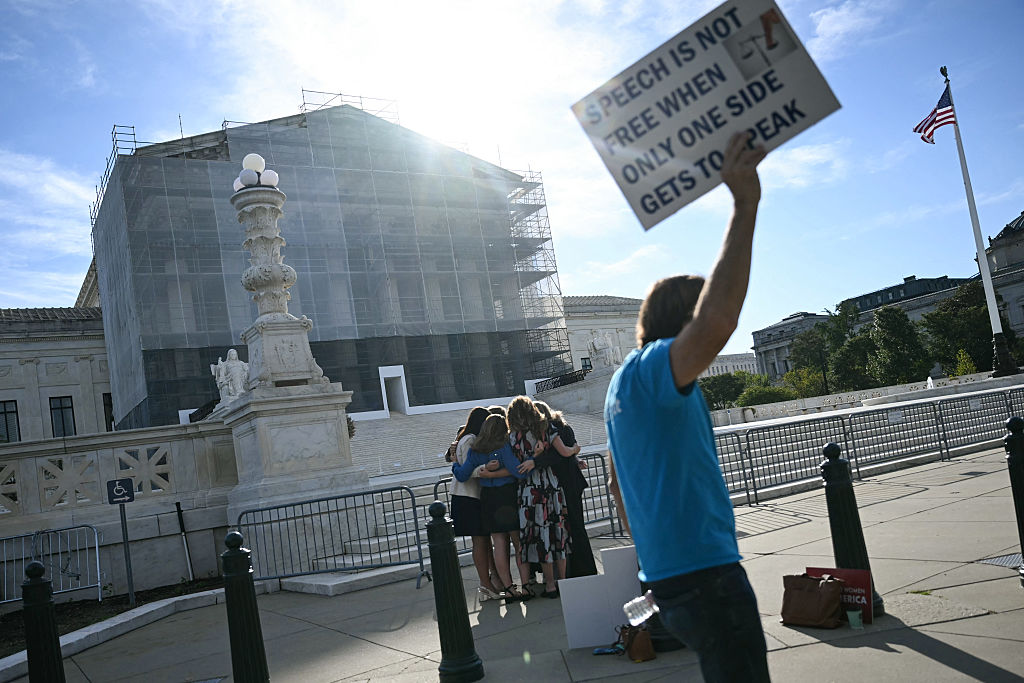I suppose we should be grateful that the New York Times has finally come out in favor of free speech. After more than four years of hysterical denunciations of anyone who questioned the tactics, rhetoric or punishments employed by #MeToo, Black Lives Matter or transgender activists — some of which were inspired by the Times’s own reporting and editorials — America’s “paper of record” has apparently become woke to the problem of mob intimidation and its deleterious impact on what the mainstream media likes to refer to as “robust” democratic debate.
I shouldn’t think a poll was necessary to support the paper’s lengthy editorial of March 20, but for readers evidently hiding under rocks, the Times provided statistical proof of what most people already knew: a substantial majority of Americans “are holding their tongues” because they might say something that would incite the rage of devotees to the cause of purification in the name of “social justice.”
Like “robust” before democratic, the use of “social” before justice suggests to me something insincere when it appears on Twitter or newspaper editorial pages. The Times, always lacking in irony, does not address such subjects in its editorial, but it does at least say this much: “Americans are losing hold of a fundamental right as citizens of a free country: the right to speak their minds and voice their opinions without fear of being shamed or shunned.” Furthermore, according to the editorial board, “The old lesson of ‘think before you speak’ has given way to the new lesson of ‘speak at your peril.’”
Though these truisms are welcome, they are not nearly enough to rectify the damage done by the Times to robust democratic debate, or to its own employees.
There is no mention in the editorial that anything might have been wrong with the newspaper’s internal affairs these past four years or the terrible example it set for the rest of the media or for politicians.
The paper’s institutional voice on free speech and the new intolerance was set immediately after the exposes of Harvey Weinstein’s decades-long sex rampage, but curiously its self-righteous anger was directed at far less obnoxious malefactors, such as Senator Al Franken, who was pressured into resigning by a media and political mob that was outraged by his clownish, occasionally insulting behavior toward women.
Thanks to Jane Mayer’s New Yorker investigation, in 2019, of the viciously unfair campaign against the liberal Franken, it’s now hard to understand how the hanging judges got away with it. But on December 7, 2017, the Times editorial board was uncompromising in its denunciation of the alleged predator — pre-Weinstein, the paper declared, Franken might have kept his seat following the accusations, but nowadays “we are in the middle of a stunning and welcome cultural shift” and “the Democratic Party deserves credit for its newfound determination to eject powerful men who think they can treat women however they want.” Creating an equivalency between Weinstein and Franken was patently absurd, and outrageous, but it helps explain much of what followed.
The forced resignation of Times editorial page editor James Bennet in June 2020 — for daring to publish an op-ed by Tom Cotton, a right-wing senator arguing for the use of federal troops to quell the riots that followed the police killing of George Floyd — was the first of two astonishingly intolerant personnel changes that hardly respected the Times’s commitment to protecting people from “shunning.” Cotton was shunned by the Times — his piece can still be read online, but not before the reader wades through a long and meretricious explanation of why it shouldn’t have been published in the first place. In addition, says the italicized introduction, “we failed to offer appropriate additional context — either in the text or the presentation — that could have helped readers place Senator Cotton’s views within a larger framework of debate.” Any honest additional context would tell readers that this op-ed piece cost Bennet his job because of a virtual stoning by Times employees.
Times management outdid itself in cowardice and intolerance the following February when it forced out Donald McNeil Jr., its chief reporter on the Covid pandemic, for having repeated the N-word in a back-and-forth conversation with students on a Times-sponsored trip to Peru that McNeil was leading. The uproar that occurred among Times editorial staffers was even crazier than the reaction to Bennet, since McNeil had uttered a racial epithet only as part of a discussion and was not advocating any action that might be deemed racist. This was an even clearer violation of the spirit of free expression. But McNeil was pressured into resigning, despite his excessive efforts to apologize to the students and his colleagues. A short time later a piece by columnist Bret Stephens criticizing the paper’s treatment of McNeil was killed by Bennet’s replacement, Kathleen Kingsbury.
Really, if the Times wants to prove its sincerity in its new fight against censorship, shaming and shunning, it should remove James Bennet and Donald McNeil from its blacklist and rehire them in the spirit of civil liberty the paper says it strives to exemplify. They don’t have to accept, but I’m sure they would appreciate the gesture.

























